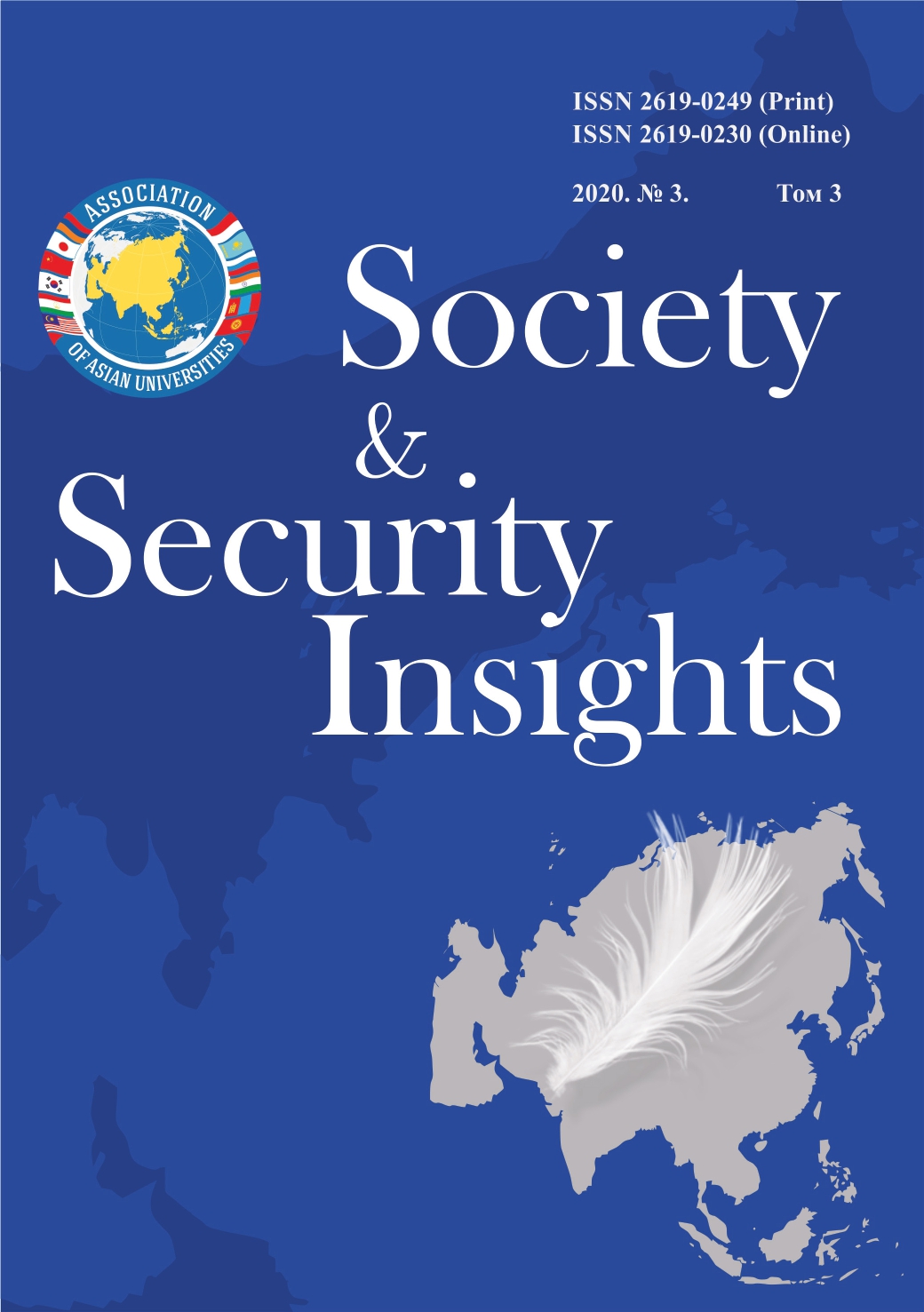ROLE OF NON-PROFIT ORGANIZATIONS IN INCREASING ELECTORAL ACTIVITY OF CITIZENS
Main Article Content
Abstract
Citizens participation in elections is the most accessible and effective mechanism for society's influence on the political system. However, the problem of absenteeism (refusal to participate in elections) is currently characteristic for Russia and in particular for the Vologda region, which actualizes the task of determining ways to increase the electoral activity of citizens. One of these methods may be the activities of non-profit organizations. The purpose of the study is to determine the role of non-profit organizations in increasing the electoral activity of citizens. The information base of the study are legislative sources, official statistics, data from sociological surveys: regular monitoring of public opinion of residents of the Vologda region (n = 1500) and an expert survey of heads of non-profit organizations (n = 35). Main methods: system, comparative, statistical and sociological analysis. The key results of the study are as follows: the dominant form of absenteeism in the region is identified (distancing from the government, not its " tacit approval»); it is established that the activities of NPOs have a positive impact on the electoral activity of citizens; a number of recommendations have been formulated for authorities, as well as for non-profit organizations themselves, to involve NPOs in the electoral process.
Downloads
Metrics
Article Details

This work is licensed under a Creative Commons Attribution 4.0 International License.
Authors retain the copyright of their manuscripts, and all Open Access articles are distributed under the terms of the Creative Commons Attribution License, which permits unrestricted use, distribution, and reproduction in any medium, provided that the original work is properly cited.
References
Дементьева И.Н. Протестные настроения жителей региона как проявление деструктивных форм гражданской активности. Society and Security Insights, 2020, No. 2, 88–103. https://doi.org/10.14258/ssi(2020)2-06
Захаров О.В. Социальные механизмы воздействия на электоральное поведение (управленческий аспект): автореф. дис. на соиск. уч. ст. канд. соц. наук. 22.00.08 - социология управления. Москва, 2011. URL: http://cheloveknauka.com/sotsialnye-mehanizmy-vozdeystviya-na-elektoralnoe-povedenie;
Каминский В.С. Трансформация общественно-политических воззрений в контексте электорального поведения населения. Проблемы развития территории, 2017, No.1, 130–144. URL: http://pdt.vscc.ac.ru/article/2110
Киселева А.М., Шпак Е.А. Социальные сети в процессе коммуникации между властью и обществом. Вопросы управления, 2015, No. 6 (18), 66–75.
Косыгина К.Е. Актуальные вопросы развития социально ориентированных некоммерческих организаций. Проблемы развития территории, 2018, 3 (95), 107–121. DOI: 10.15838/ptd.2018.3.95.7
Либоракина М.И. Некоммерческий сектор: международный опыт. URL: http://www.socpolitika.ru/rus/ngo/foreign_experience/document115.shtml
От плебисцита к выборам. Как и почему россияне голосовали на выборах 2011 – 2012 гг. Под. ред. В. Федорова. М.: Праксис, 2013.
Downs A. An Economic Theory of Democracy. N.Y., 1997.
Franklin M. Voter turnout and the dynamic of electoral competition in established democracies since 1945. Cambridge: Cambridge University Press, 2004.
Gerber A., Green D. Get Out the Vote. Washington. US: Brookings Institution Press. 2008.
LeRoux K., Krawczyk K. Can Nonprofit Organizations Increase Voter Turnout? Findings From an Agency-Based Voter Mobilization Experiment. URL: https://journals.sagepub.com/doi/abs/10.1177/0899764012459909
Rongitsch B. Election 2008: More Nonprofits Engaging More Voters. The Nonprofit Quarterly, 2008. URL: https://nonprofitquarterly.org/
Riker W. H. Implications from the Disequilibrium of Majority Rule of the Study of Institutions. American Political Science Review, 1980, 74, 432–46
Verba S., Nie N. Participation in America. N.Y., 1972.
Wolfinger R., Rosenstone S. Who Votes? New Haven, CT: Yale University Press, 1980.
REFERENCES
Baskakova, Y.M. (2012). «My etu vlast' ne vybirali»: absenteizm na vyborakh 2011–2012 g. [«We Didn't Choose This Power»: Absenteeism in the 2011–2012 Elections]. Monitoring obshchestvennogo mneniya: ekonomicheskiye i sotsial'nyye peremeny [Monitoring Public Opinion: Economic and Social Changes], no. 5, 5–15.
Dementyeva, I.N. (2020). Protestnyye nastroyeniya zhiteley regiona kak proyavleniye destruktivnykh form grazhdanskoy aktivnosti [Protest moods of the inhabitants of the region as a manifestation of destructive forms of civil activity]. Society and Security Insights [Society and Security Insights], no. 2, 88–103. https://doi.org/10.14258/ssi(2020)2-06
Zakharov, O.V. (2011). Sotsial'nyye mekhanizmy vozdeystviya na elektoral'noye povedeniye (upravlencheskiy aspekt) [Social mechanisms of influence on electoral behavior (managerial aspect)] (PhD Thesis), Moscow. URL: http://cheloveknauka.com/sotsialnye-mehanizmy-vozdeystviya-na-elektoralnoe-povedenie
Kaminskiy, V.S. (2017). Transformatsiya obshchestvenno-politicheskikh vozzreniy v kontekste elektoral'nogo povedeniya naseleniya [Transformation of social and political views in the context of the electoral behavior of the population]. Problemy razvitiya territorii [Territory development problems], no. 1, 130–144. URL: http://pdt.vscc.ac.ru/article/2110
Kiseleva, A.M., Shpak, Y.A. (2015). Sotsial'nyye seti v protsesse kommunikatsii mezhdu vlast'yu i obshchestvom [Social networks in the process of communication between the authorities and society]. Voprosy upravleniya [Management Issues], 6 (18), 66–75.
Kosygina, K.E. (2018). Aktual'nyye voprosy razvitiya sotsial'no oriyentirovannykh nekommercheskikh organizatsiy [Topical issues of development of socially oriented non-profit organizations]. Problemy razvitiya territorii [Territory development problems], 3 (95), 107–121. DOI: 10.15838/ptd.2018.3.95.7
Liborakina, M.I. Nekommercheskiy sektor: mezhdunarodnyy opyt [Non-profit sector: international experience], URL: http://www.socpolitika.ru/rus/ngo/foreign_experience/document115.shtml
Ot plebistsita k vyboram. Kak i pochemu rossiyane golosovali na vyborakh 2011–2012 g. [From plebiscite to elections. How and why did Russians vote in the 2011-2012 elections]. Pod. red. V. Fedorova. M.: Praksis, 2013.
Downs A. (1997). An Economic Theory of Democracy. N.Y.
Franklin M. (2004). Voter turnout and the dynamic of electoral competition in established democracies since 1945. Cambridge: Cambridge University Press.
Gerber A., Green D. (2008). Get Out the Vote. Washington. US: Brookings Institution Press.
LeRoux K., Krawczyk K. Can Nonprofit Organizations Increase Voter Turnout? Findings From an Agency-Based Voter Mobilization Experiment. URL: https://journals.sagepub.com/doi/abs/10.1177/0899764012459909
Rongitsch B. (2008). Election 2008: More Nonprofits Engaging More Voters. The Nonprofit Quarterly, URL: https://nonprofitquarterly.org/
Riker W. H. (1980). Implications from the Disequilibrium of Majority Rule of the Study of Institutions. American Political Science Review, no. 74, 432–464
Verba S., Nie N. (1972). Participation in America. N.Y.
Wolfinger R., Rosenstone S. (1980) Who Votes? New Haven, CT: Yale University Press.


 http://orcid.org/0000-0001-5875-8912
http://orcid.org/0000-0001-5875-8912